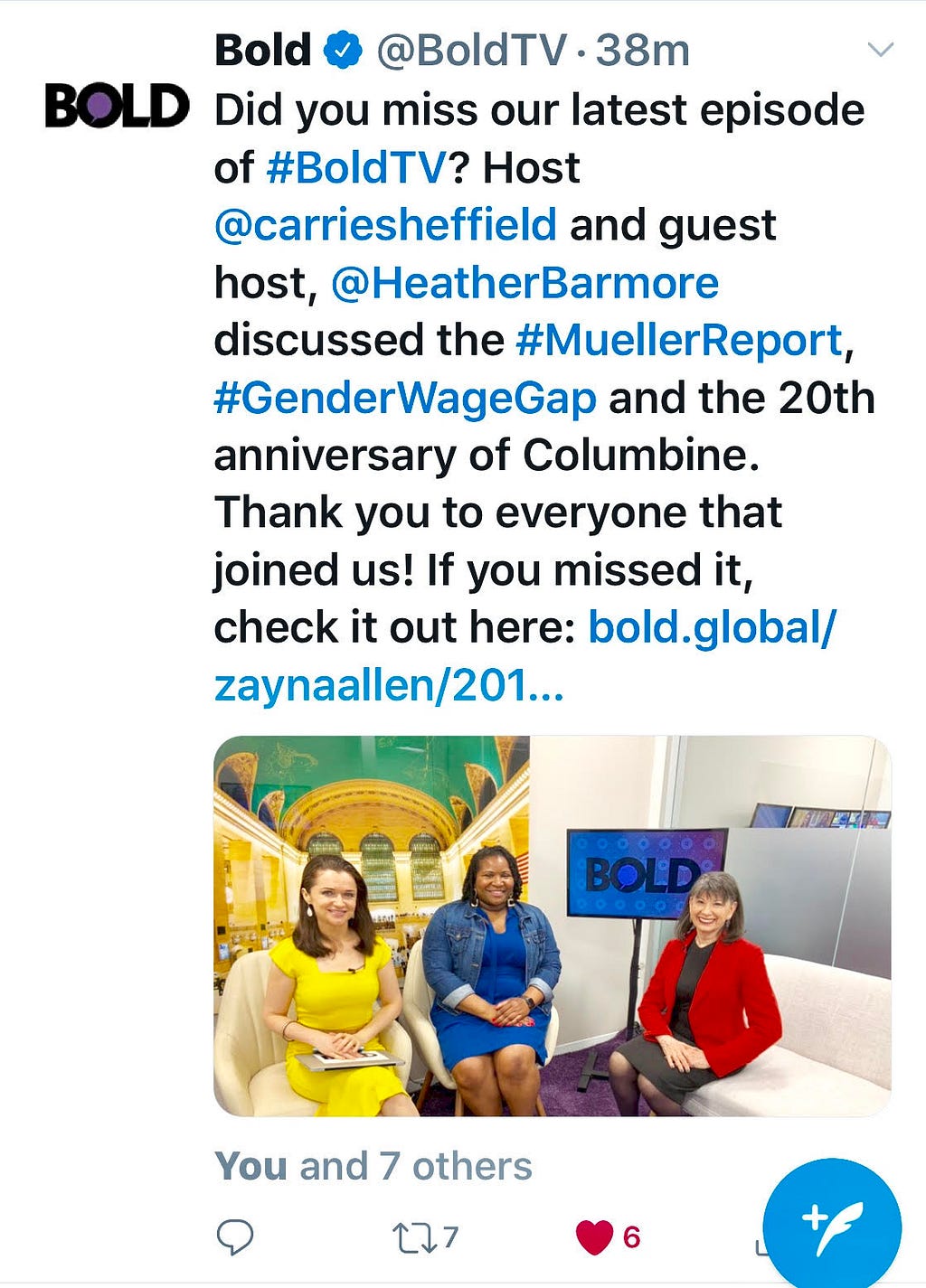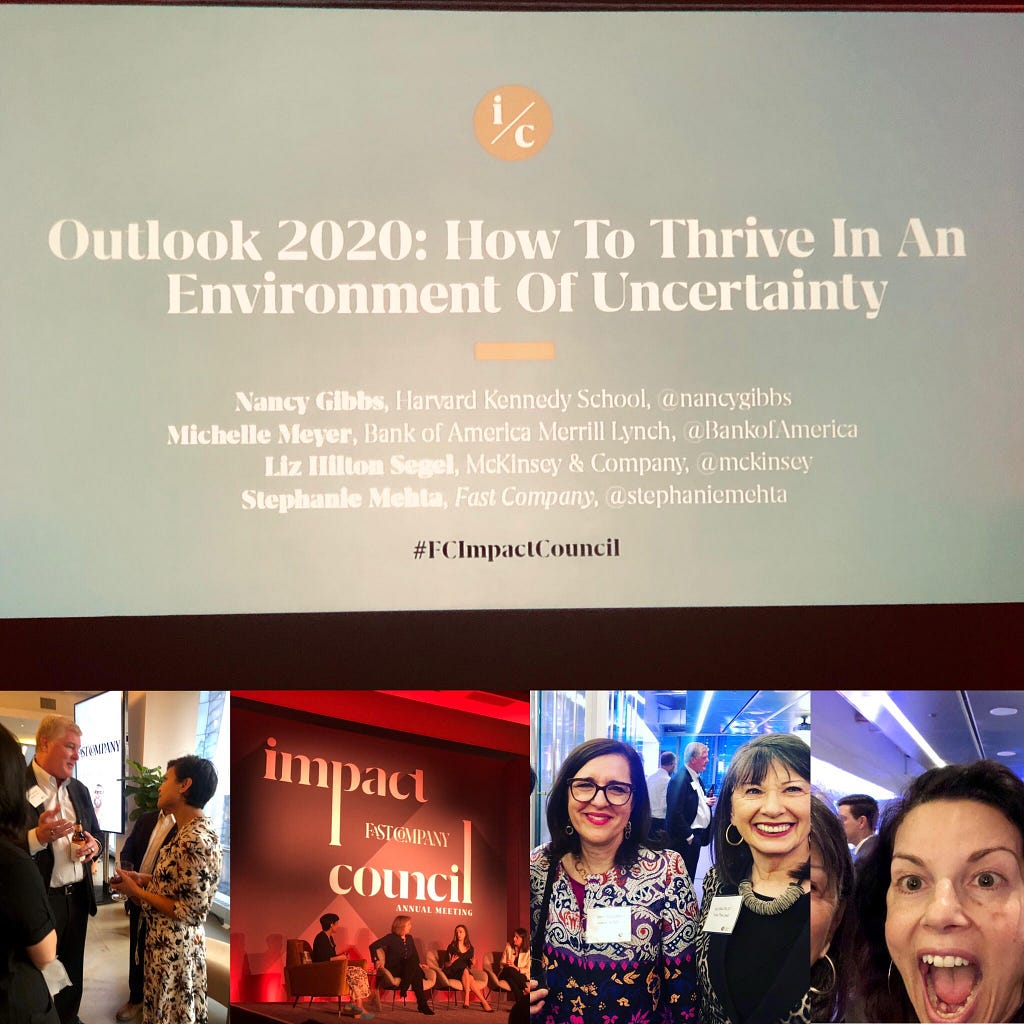How Technology Brings Chaos and Opportunity for Women to Disrupt, Innovate, Create

Issue 91 — April 21, 2019
I remember how taken I was when I read science historian James Gleick’s 1995 article “Just a Damn Minute.”
He wrote there and in award-winning books such as Chaos how technology was making our world spin faster and faster, so that despite technology’s intent to save time and make life easier, instead we’re multitasking (what can we accomplish in the 90 seconds it takes for the microwave to reheat leftovers?) and otherwise using technology to cram ever more into our already busy lives.
More importantly, he observed, the ever-faster technology exceeds our human capacity to process the ever-more complex information with which we are bombarded.

Technology has enabled digital media startups like BoldTV where I appeared last week, not reliant on traditional networks to deliver their content.
As CEO of a large Planned Parenthood affiliate at the time, I shared the article with many colleagues, whose conversations tended to obsess over the complexity of our work and fears about how to cope with the rapid rate of change in healthcare.
Other prognosticators suggested that our culture, policies, and ethics can’t keep pace with the accelerating speed of technological change either. We just aren’t ready and can’t possibly cope with the impending probability that smart technology and artificial intelligence will destroy jobs as we have known them. Political turbulence and instability will follow. Yada yada.
Your head could explode with worry that the world will soon implode and everything you know will be turned upside down. Get used to it, because they are right. But that’s not the end of the world; it’s more likely to be the beginning of a new one.
In times like these, it’s good to remember there are always times like these.
Fast forward 24 years after the Gleick article to two conferences I attended recently. First, the International Women’s Forum Cornerstone Conference in Barcelona April 10–12, followed by Fast Company magazine’s inaugural Impact Council conference in New York April 18.

Fast Company is my favorite business magazine, so I was thrilled to attend its inaugural Impact Council Conference. Bottom far and mid-left: Editor-in-Chief Stephanie Mehta welcomes attendees and panelists, mid-and far right, I met up with IWF friend Mary McDowell and Mightybell founder Gina Bianchini.
The distinguished speakers in various ways articulated these three things I have been hearing throughout my entire career:
1. The world is increasingly complex because the rate of change is accelerating.
2. Technology is outpacing human capacity to adapt our work and the economy to it. We’re all going to be out of a job soon.
3. Our previous ethical framework no longer applies. And fragmented media results in public opinion divided on almost every major issue because people can choose to watch, read, and listen to only those outlets with which they already agree. This challenges leaders as never before.
To be sure, claims of the negative impacts of new technologies have merit.
By 2025 over 25 billion devices will be connected over the world, for example. That’s over three devices for every one of the eight billion men, women, and children expected to inhabit this planet. Data is the new oil. China expects to have full country wired for 5G by 2023, due to their ability to mandate these expenditures quickly by government policy, whereas Western democracies are far less agile and susceptible to falling behind in the data race.
Further, many unsettled policy questions exist and more will arise from technological advances. And low-income people in the developing world are likely to have significantly less access to technology absent some kind of global policy action on their behalf. This will exacerbate the wealth chasm between the haves and have nots, creating more political instability and chaos.

Classic building designed by Barcelona’s famed architect Antoni Gaudi (1852–1926)
And rapid change can be disorienting. Twenty-two years after Gleick’s NY Times article, Anastasia Dedyukhina, author of Homo Distractus, wrote in Thrive Global: “Before the tech revolution, our time perception was based on the human speed, a metabolic speed of our bodies, emotions and reflexes. With the tech progress, though, we are forced to function on a tech speed, which contradicts our human rhythms… Working under pressure induced by tech rhythms is like putting your brain in the state of emergency every minute.”
If chaos is the new normal, let it carry you forward.
Stephanie Mehta, editor-in-chief of Fast Company summed up the prevailing message of both conferences: “Chaos and uncertainty are the new normal.”
And I thought, when was it ever otherwise? People who can think, work, and live in ambiguity and change will always be among the most successful, regardless of their field of endeavor, in my observation after many decades as a CEO. In fact, that’s exactly why I created my Leadership Power Tool #5, Carpe the Chaos.
The solution to the problem always changes the problem, it seems. Why should we be surprised that change begets change and upsets the comfort of stasis? But we also forget that stasis lacks creative yeast.
Why do we forget that nothing just happens — people make things happen and therefore instead of worrying about the future, we would be better served to spend our energies creating it proactively and intentionally. And why do we get so thrown off by changing technologies that we lose sight that chaos is opportunity to shake people out of entrenched ways of thinking and enable us all to try different, possibly better, solutions?
Every disruption is an opportunity for someone, and today women are best prepared
Let’s face it: people of privilege often resist change because change is perceived to bring about a loss of their control, privilege, and power.

Wall art I happened upon in Barcelona — feminist social change agents.
Yet, in my leadership experience, I’ve found that chaos is inevitably an opportunity for previously undervalued or under-resourced groups to leapfrog over established ways of doing things. Interestingly, when polled, about half the Women’s Forum attendees thought the accelerating and new technologies will create more equality and half thought they would create more inequality.
But all agreed that the skills most needed in the future are those traditionally attributed to women: flexibility, collaboration, inclusivity.
Jenny Fleiss, cofounder of Rent the Runway and founder of her latest venture, Jetblack in Walmart’s new accelerator Store №8, exemplifies that skillset. She spoke in optimistic terms at both conferences about how technology is changing retail markets. Clearly Fleiss, whose new company aims to revolutionize retail shopping via text, notes that time is the greatest luxury in today’s fast-paced world. She emphasized that it’s important to build trust by assuring consumers their data won’t be misused, and she feels that can be done.

Jetblack founder and Rent the Runway cofounder Jenny Fleiss describes how technology has provided opportunities to disrupt the fashion industry to better serve consumers.
We can acknowledge that today’s rapid rate of change brings problems with it.
But as someone with a bias toward action, I believe such acknowledgment must be coupled with positivity about the opportunities that change brings, and a visionary intention not merely to solve problems, but also to create entirely new realities in which more people can thrive.
GLORIA FELDTis the Cofounder and President of Take The Lead, a motivational speaker and expert women’s leadership developer for companies that want to build gender balance, and a bestselling author of four books, most recently No Excuses: 9 Ways Women Can Change How We Think About Power. Former President of Planned Parenthood Federation of America, she teaches “Women, Power, and Leadership” at Arizona State University and is a frequent media commentator. Learn more at www.gloriafeldt.com and www.taketheleadwomen.com. Tweet @GloriaFeldt.
